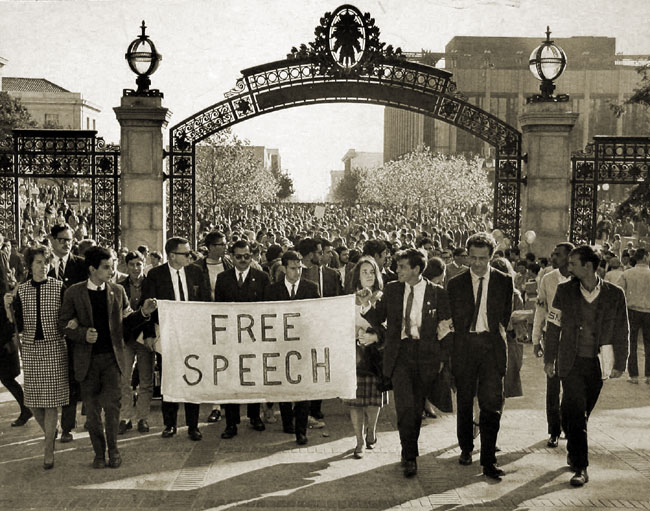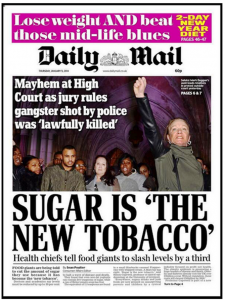No, the U of California does NOT forbid faculty to express opinions about the soda tax
Last Friday, I received a phone call from Todd Kerr, the publisher of The Berkeley Times, a community newspaper in Berkeley, CA. He was preparing a story on the Berkeley soda tax and could not find University of California (UC) faculty who were willing to speak with him.
They were, they told him, under a gag order from the president’s office not to talk to reporters about the soda tax.
I can understand his frustration. I spoke or e-mailed about 10 people with knowledge of this issue and only two would allow me to quote them for attribution.
For starters, the idea of a gag order seems contrary to current practice.
- Michael Pollan, a Berkeley journalism professor, says he publicly endorses the tax, and so have other professors.
- Chancellor’s Professor Robert Reich wrote a column endorsing it, and UC Berkeley posted his comments on its website.
- UCSF has featured research on the health implications of a soda tax on its website.
- The 50th anniversary celebration of Berkeley’s Free Speech Movement (FSM) starts this week.
But the rumor is serious and deserves investigation.
I sent out queries to try to find out if the rumor could have any basis in fact.
Mr. Kerr kicked off the process by giving me the names of the three faculty members he said had refused to speak with him about the soda tax.
I was able to track them down. Here is what they told me (not for direct quotation or attribution):
- Source #1: Mr. Kerr had asked scientific questions outside the respondent’s area of expertise.
- Source #2: Mr. Kerr stated that his paper does not take a stance on issues, so HE can’t write for or against the tax. This respondent’s understanding is that Berkeley faculty members can state opinions on any voting matter as long as they do not claim to speak for the university.
- Source #3: University counsel advised this respondent that faculty can say what they want as private citizens, but not as UC employees. This source’s understanding is that state employees are not permitted to work to alter the conduct or outcome of matters on which the public is voting. And, if the food industry were to sue a faculty member for something said in the course of an election campaign, the university would not provide legal resources or defense.
Source #3’s comments especially demanded further inquiry. I did some more consultation of UC faculty, legal staff, and professional staff.
UC policy on political speech is governed by state law
As one source explained, there is no gag order on faculty. There are, however, state statutes that limit the University’s ability to take positions on ballot measures that are before the voters (be sure to look at the Webinar slide show). These state in a Q and A:
May a University employee endorse a ballot measure in his/her private capacity and identify himself/herself by University title?
Yes. A University official may allow use of his/her name and title for identification purposes in the same manner as others who sign an endorsement. An express disclaimer of University endorsement is required only where the context might reasonably cause confusion as to whether the endorsement is made in an official or unofficial capacity.
My queries eventually landed in the Office of the President of the UC System. Steve Montiel, Media Relations Director, one of only two people in all of this who was willing to be quoted by name, said:
All University of California employees, including faculty, have the right to express their personal opinions about any matter of civic importance, including ballot measures. Consistent with state law, however, longstanding University policy prohibits university resources from being used to oppose or support a ballot measure. Only the UC Board of Regents can take a public position on a ballot measure, and it has done so in the past.
I also consulted Michele Simon (the second quotable) about state policy. She notes that this is standard policy for institutions receiving state funding. UC is a state school and, therefore, is not allowed to use state funds to take political positions.
She reminded me that at Stanford, a private institution, Henry Miller of the conservative Hoover Institute violated Stanford’s no-position policy on ballot measures when he did a TV ad opposing Proposition 37, the GMO labeling initiative, using his Stanford affiliation.
When we learned of the ‘No on 37 ‘ commercial, we immediately asked to have it changed so it would be in compliance with Stanford policies,” said Debra Zumwalt, the university’s vice president and general counsel. “While everyone at Stanford is entitled to espouse whatever political view he or she may choose, we do not allow people affiliated with Stanford to take a political position in a way that could imply that it is Stanford’s position.”
In my own experience, UC’s policy also sounds like standard practice. When the Sugar Association threatened me with a lawsuit (see documents under Controversies at the bottom of the Media pages), that’s pretty much what NYU lawyers told me. If I said something libelous, I would be responsible for the legal consequences. Luckily, the Sugar Association never sued.
So—how did this rumor get started?
Here’s what I learned.
A group of faculty advocating for the soda tax asked to meet with university legal counsel for advice about how to protect themselves and the university against potential lawsuits filed by, for example, the American Beverage Association (ABA), which has been especially aggressive in fighting the tax. The ABA’s actions reminded them of the cigarette industry’s fight with the UC system over the tobacco control archives now housed at UCSF.
Some of the legal advice to faculty—if you speak at a soda tax rally, represent yourself as an individual,not a representative of the university, and do so on your own, not the university’s time—can be interpreted as restrictive even if it is not meant as such.
UC’s policy on academic freedom
Please note that UC, since the time of the Free Speech Movement, has developed a clear policy on academic freedom:
…academic freedom depends upon the quality of scholarship, which is to be assessed by the content of scholarship, not by the motivations that led to its production. The [policy]…does not distinguish between “interested” and “disinterested” scholarship; it differentiates instead between competent and incompetent scholarship. Although competent scholarship requires an open mind, this does not mean that faculty are unprofessional if they reach definite conclusions. It means rather that faculty must always stand ready to revise their conclusions in the light of new evidence or further discussion. Although competent scholarship requires the exercise of reason, this does not mean that faculty are unprofessional if they are committed to a definite point of view. It means rather that faculty must form their point of view by applying professional standards of inquiry rather than by succumbing to external and illegitimate incentives such as monetary gain or political coercion. Competent scholarship can and frequently does communicate salient viewpoints about important and controversial questions [my emphasis].
My translation: if faculty opinions about the soda tax are based on research—and plenty of research is available to back up the rationale for and potential efficacy of such a tax (see Rudd Center and Bridging the Gap)—faculty not only have the right but also have the responsibility to express opinions about them.
UC faculty: get out there and support the tax!
And wish the FSM a happy 50th anniversary.



